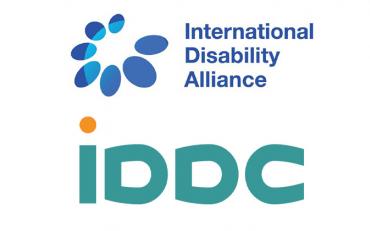<< Back to the IDA-IDDC End-Discrimination Campaign - COVID19 webpage
IDA and IDDC joint statement on the World Refugee Day 2020
The International Disability Alliance and the International Disability and Development Consortium, mark the 2020 World Refugee Day recognizing the devastating impact of the COVID-19 pandemic on refugees around the world. People living in refugees camps and other informal settings, including those who are transient and without shelter, all face increased exposure to the impact of COVID, not only to their own health, or health of extended family members, but also in terms of access to education, livelihood and food security.
Persons with disabilities comprise a significant portion refugees, yet, due to lack of inclusive registration and data collection processes among these populations, there is very little data available on their situation both before and during the pandemic. However, evidence that is emerging globally from persons with disabilities and the civil society including organizations representing persons with disabilities highlights common barriers due to deep-rooted inequalities, stigmatized attitudes, and widespread exclusion exacerbated by the lack of disability-inclusive response to the current crisis. Some of these barriers include discrimination in accessing healthcare and life saving procedures, lack of access to information, reduced access to public transportation, and interruption of key support services such as personal assistance. Isolation due to physical distancing and the barriers persons with disabilities face in protecting themselves from transmission increase the risk they face. The under-represented groups of persons with disabilities including women and girls, indigenous people, hard of hearing and deaf persons and persons with deafblindness, intellectual and psychosocial disabilities, face intersectional discrimination and are very likely to be left behind in emergency response and recovery.
For persons with disabilities living in refugee camps or for those who live in urban settings including city margins, slums and incomplete buildings, all of these barriers become exacerbated due to challenges to maintain physical distancing and other preventative measures due to living in densely populated contexts. Food insecurity due to loss of livelihood, lack of access to health (including rehabilitation) and mental health and psychosocial support, lack of access to wash, sanitation and hygiene services and items, and also lack of legal status are all factors contributing to increased risk for refugees, returnees, asylum seekers and internally displaced persons with disabilities. Increased risk of being exposed to violence, abuse and exploitation including sexual and gender-based violence is an increasing and serious concern during the pandemic.
The impact of COVID19 will continue to be felt during 2020 and many years beyond. As governments, intergovernmental agencies and civil society including organisations representing persons with disabilities engage in the response and also the recovery, ensuring the human rights of refugees , returnees, asylum seekers and internally displaced persons with disabilities is critical more than ever. Article 11 of the Convention on the Rights of Persons with Disabilities and other important policies and guidelines such as; the United Nations Guidelines on the Inclusion of Persons with Disabilities in Humanitarian Action, the UN’s May 2020 COVID-19 Global Humanitarian Response Plan and A Disability-Inclusive Response to COVID-19 provide guidance on how to implement a disability inclusive approach to ensure equal protection and fulfilment of all human rights of refugees and internally displaced persons with disabilities.
We call on all inter-governmental agencies including the United Nations High Commission for the Refugees, governments, donors and civil society to ensure adoption of a disability inclusive approach at all stages of all activities aiming to support refugees, returnees, asylum seekers and internally displaced populations from needs assessment and planning to implementation, monitoring and evaluation.
For this purpose:
- All programs designed to support refugees, returnees, asylum seekers and internally displaced persons must be disability-inclusive, and all programs aiming to support persons with disabilities particularly in countries facing humanitarian emergencies must be inclusive of refugees, returnees, asylum seekers and internally displaced persons with disabilities.
- Specific policies and programs must be designed with full and meaningful participation of persons with disabilities and their representative organisations to ensure inclusion and equal protection of refugees and internally displaced persons with disabilities.
- All necessary measures must be adopted to collect, disaggregate, analyse and disseminate data and information on refugees with disabilities and the barriers they face in the context of COVID19 response and recovery.
Resources and tools:
- IDA and IDDC: Infographic - Refugees with Disabilities and Covid19
- United Nations High Commissioner on Refugees: Advocating for the needs of persons with disabilities - World Refugee Day 2020
- United Nations High Commissioner on Refugees: Global Report 2019
- United Nations High Commissioner on Refugees: Global Trends Report 2019
- Humanity and Inclusion: COVID-19 in humanitarian contexts: no excuses to leave persons with disabilities behind! (June 2020) - PDF Format
- Humanity and Inclusion: COVID-19 in humanitarian contexts: no excuses to leave persons with disabilities behind! (June 2020) - Word Format
Photo credit: UNHCR

